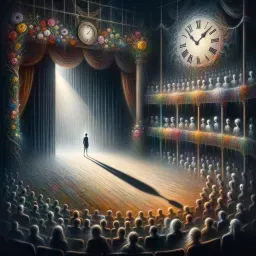Words, words, mere words, no matter from the heart

- Meaning
- This phrase speaks to the idea that words alone, without genuine sentiment or intention, lack substance and meaning. It highlights a universal human experience where promises, declarations, or expressions become empty if they don't come from the heart. Philosophically, it underscores the value of authenticity and the inherent skepticism people may have towards language that is not backed up by heartfelt sincerity.
- Allegory
- The grand hall symbolizes the traditional reverence and weight given to language and words. The floating, glowing words represent the allure and beauty of language, but their transparent and ghostly nature signifies the lack of substance when not backed by genuine emotions or intentions. The person holding a radiant heart close to their chest exemplifies the core message of the phrase – sincerity and heartfelt emotion are what truly give words their meaning. The contrast between the ethereal words and the solid, glowing heart underscores the central idea that authenticity and genuine emotion are irreplaceable.
- Applicability
- Applying this phrase in personal life involves recognizing the importance of sincerity in communication. Whether in relationships, professional settings, or public discourse, ensuring that our words align with our true feelings and intentions can forge trust and foster genuine connections. It serves as a reminder to be mindful of the impact of our words and to strive for authenticity.
- Impact
- This phrase has resonated through history as a critique of empty rhetoric, particularly in literature and political discourse. It has inspired numerous discussions on the nature of communication and the importance of authenticity. Used frequently in critiques of insincere speech, it's a powerful reminder in advocating for genuine human connection and integrity.
- Historical Context
- "Troilus and Cressida" was written around 1602, during the early 17th century in the Elizabethan era. This was a time of great literary activity in England, with Shakespeare being one of its most influential figures. This context reflects the play's exploration of themes like love, war, and honor, often questioning and critiquing the human condition and societal norms of the time.
- Criticisms
- Critics might argue that the phrase promotes cynicism towards verbal expressions of emotion and intent, potentially undervaluing the power of words themselves. In some contexts, words can indeed inspire, comfort, and effect change, even if they don't always fully stem from the heart. Thus, the phrase could be seen as somewhat reductive by implying that words are always devoid of meaning without accompanying heartfelt emotion.
- Variations
- There aren't notable variations of this specific phrase, but the theme of valuing deeds over words appears across different cultures and languages. For example, in Chinese culture, the idiom "空喊口号" (kōng hǎn kǒuhào) translates to "empty slogans," similarly criticizing the lack of substance behind spoken or written promises.
-

The empty vessel makes the loudest sound.
-

How sharper than a serpent's tooth it is to have a thankless child!
-

Give sorrow words; the grief that does not speak knits up the o-er wrought heart and bids it break.
-

O, beware, my lord, of jealousy; It is the green-ey'd monster which doth mock the meat it feeds on.
-

I wasted time, and now doth time waste me.
-

Life's but a walking shadow, a poor player that struts and frets his hour upon the stage and then is heard no more.
-

The quality of mercy is not strain'd, it droppeth as the gentle rain from heaven upon the place beneath.
-

O, what a rogue and peasant slave am I!
-

Love all, trust a few, do wrong to none.
-

There was never yet philosopher that could endure the toothache patiently.
-

False face must hide what the false heart doth know.
-

I will praise any man that will praise me.
No Comments